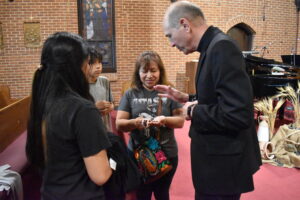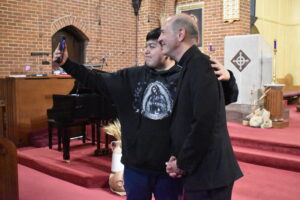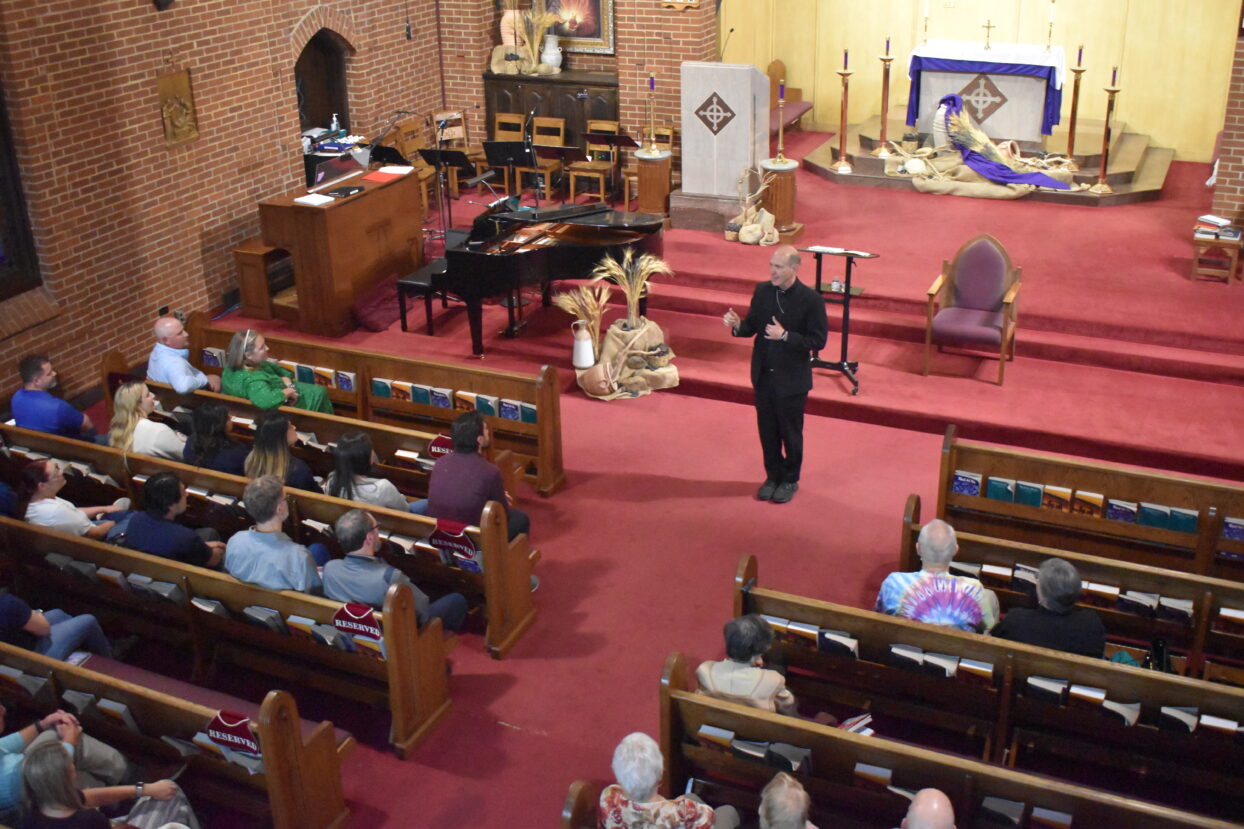He tells those attending the event that ‘we have to have a vibrant, living connection with Jesus’
By Claire Collins
Bishop Mark Beckman traveled to Chattanooga on March 26 to give a Lenten retreat at Our Lady of Perpetual Help Church, welcoming both OLPH and Basilica of Sts. Peter and Paul parishioners. The topics covered included prayer and meditation, the Paschal mystery, and following Christ.
“As we speak about the Paschal mystery” Bishop Beckman said, “we are really speaking about dying and rising with Christ.”
Many people gathered at OLPH, including clergy, parishioners, and even the catechumens at the parish. Father Arthur Torres, pastor of OLPH, hosted the event in conjunction with associate pastor Father Matthew Donahue. Also attending were Father Mike Creson, Deacon A.J. Houston, and Deacon Wade Eckler.
Bishop Beckman led attendees through a night full of prayer and meditation and shared many stories about his own prayer experiences connected with a multitude of significant life events on his journey of faith.
Speaking about Ash Wednesday, Bishop Beckman said, “Catholics are drawn to the liturgies where we ‘get something,’ but I think we have a visceral connection with the beginning of Lent—there’s something in our spirits that knows that we need Lent.”

Bishop Mark Beckman blesses a rosary at the Lenten retreat at Our Lady of Perpetual Church in Chattanooga. (Photo Claire Collins)
He recounted the experiences of giving ashes over many years and the stark juxtaposition of giving them both to the aged and near death and mothers with their newborn babies. He recalled the ancient phrase memento mori, that we should remember that we’re all going to die and to remember our lives in the context of eternity.
He recalled one year when Ash Wednesday coincided with Valentine’s Day while he was serving at a school. A reflection he read in preparation for that Mass said, “Is there a more important sign of love than the cross? That is the moment when God fully revealed His love for us.” The reflection mentioned that, in conjunction with the phrase, “remember you are dust, and to dust you shall return,” a Valentine’s Day Ash Wednesday could also remind us of the love of God. “We should also remember the words, ‘Remember that you are loved and to Love you will return.’” That memory was in his mind with each person he gave ashes to, the bishop said.
Bishop Beckman then guided retreat participants on a journey of remembering that love in each of their hearts.
“We have to go back to the beginning,” he said, “and the beginning is God created each one of us out of infinite love. That’s the only reason God created the universe. God did not need the universe for Himself, He didn’t need us, but out of pure love, selfless love, we were each created in the image and likeness of God.”
He described the very breath of God being breathed into Adam to give him life in the garden, and then recounted how often in prayer he likes to pray with his breath.
“The very act of breathing is a pure gift,” Bishop Beckman said. “Every breath is a gift from God—an act of remembrance of the tender love of God for each one of us.”
He recalled his retreat with the 30 Day Spiritual Exercises in Gloucester, Mass., and the many eight-day silent retreats he has attended, and how, “on those retreats, you always start your meditations with being loved by God and stay there in prayer until you receive that love.”
During the evening, Bishop Beckman led the group through two prayer meditations. In the first, he invited participants to be still with God in silence and to see what came up in their minds and hearts. After two minutes of silence, he invited a few people to share their experiences. He spoke into the distractions that come to our minds in prayer, the emotions we experience, and how we can become fidgety from the sounds and interruptions around us.
Bishop Beckman even spoke to his own thoughts during the meditation. “Tonight, I was like, ‘Do they think this is crazy?’” But his vulnerability opened the door for participants to feel the freedom of sharing their honest thoughts and prayers.
“Years ago, sounds used to distract me in stillness,” he said. “And now they are just part of the symphony of the sounds around me—they don’t distract me; they’re woven into the stillness. Just like my thoughts and feelings are no longer distractions, but I let them become like clouds moving across the sky.”

Bishop Beckman poses for a selfie with an attendee at the Lenten retreat at Our Lady of Perpetual Church in Chattanooga. (Photo Claire Collins)
He then invited attendees to, during the Lenten season, “Pray more intimately than we normally pray—do something differently than we normally do.”
Bishop Beckman spoke about what it looked like for him to begin to fall in love with God. He said that, when we have an earthly experience of falling in love, we have, “…a lot of conversation. I want to tell you all about myself. I want to hear about you. Let’s tell each other the stories of our lives, the things that matter. I want to know you; I want to hear your story.” This, he said, is analogous to our relationship with God.
He recounted his first experiences of conversations with God. “I would walk alone at night down the road in front of the house,” he said, “and I would talk to God. I wanted to tell God what was happening in my life. Tell Him the story of my life. I don’t know that I was as good at listening when I was that age, but I did want to tell God about what was going on in my life.”
He then asked what conversation was like for a couple married for 50 years. “What’s different?” he asked. “Less conversation,” he responded, accompanied by laughter throughout the crowd.
“My parents can be driving down the road in the car together totally silent for 30 minutes or an hour,” Bishop Beckman recounted, “and my dad will say, ‘you know?’ and Mom goes, ‘yes.’ As we mature in our relationship with God, there is a call to a deeper being with God in stillness and in quiet, and in my mind, a healthy sign of maturity. There’s something fun as we get closer to God, that yearning for being with the One we love.”
When experiencing distractions in prayer, Bishop Beckman gave attendees a different viewpoint than normally considered.
“Distractions can be the enemy,” he said, “or it could be that we are so unaccustomed to experiencing deep inner peace and joy that I don’t know what to do when I’m feeling that peaceful and joyful. To be still with God’s love for me, sometimes we’re allergic to it. To be so purely loved by the God who created us, that we cannot simply be with God and allow God to communicate His infinite love to us. Allowing God to love us is so important—so sometimes it’s important for me to become aware of what are the obstacles in my heart that are keeping me from allowing that to happen.”
Bishop Beckman then led the group through a prayer awareness exercise of their whole body, noticing the felt experience from the top of their heads to the tips of their toes. He invited retreatants to ponder a time when they felt deeply loved, considering where they were, what happened, and what it was like.
Bishop Beckman then recounted the experience of giving ashes to his dying grandmother in the hospital just before she passed—ashes from his own forehead, because he realized he did not have any with him. After she passed away, he went on a retreat, and the fullness of his grief was finally able to wash over him. Seeing an oak tree, he asked God why that tree can live for years and years and his grandmother cannot.
His wise retreat director sent him straight to Jesus for his retreat, and in his meditation, he was taken back to his grandmother’s hospital bed.
“I began to cry and looked, and on the other side of the bed, Jesus was standing there looking at me with love. He was loving me as He took my grandmother, and it was a profoundly healing moment.”
He then asked his retreat director, “Is that my imagination, or is that God speaking to me? And he said, ‘yes.’ And I realized God does speak to us in and through all the gifts he’s given to us, including our imagination. And what Jesus did was He took me, while He brought Himself right into my story, and showed me that He was loving me through my grandmother, and that He loved her.” Part of journeying with God, Bishop Beckman said, is seeing what God has allowed in our lives, seeing where God was in it all, and believing He chose it all for us, letting go of anything that gets in the way of letting God love us.
Bishop Beckman then spent the last portion of the retreat touching on the other two aspects of Lent, fasting and almsgiving, and how one could approach those more fully during Lent.
Fasting, he said, is simply giving up stuff. He recounted giving up television as a kid and how it was life-changing because he never wanted to go back again. It opened up a space in him that he was able to start to let God fill.
“(Fasting) creates an empty space in our hearts that is meant to be filled with something more important, which is God.” Fasting is a letting-go of those things in our hearts that prevent us from being open to God and His love for us, Bishop Beckman said, and who God wants us to be.
“Sins clog our hearts up… what could I ask God to help me let go of?”
He then went on to share a comic, humble, and all-too-relatable story about anger and the Holy Land. In a long line to place his hand in the long-held site of the crucifixion, he encountered a woman angry about having to wait in line. He noticed the presence of this anger as he went to encounter this holy place in such a sacred moment, and the invitation from Jesus to forgive his sister in Christ as he touched the spot where Jesus’s cross stood.
Afterward, he was able to experience Mass in the tomb of the Holy Sepulcher and a special grace from God. When he knelt down at the stone where Jesus’ body laid, he thought, “Wow, I could never be any closer to the resurrection than I am right now,” to which God responded, “No, Mark, every single time you celebrate the Eucharist, that’s when you are the closest to the resurrection, right there at the altar. That’s where my dying and rising are represented. That’s where it takes place. This was just another experience of God speaking to us.”
Bishop Beckman then reminded those attending that almsgiving comes from love of God that allows for loving our neighbor as ourselves, but that it can become hard to fully understand this when we don’t love ourselves very well. This is why we must remember who and whose we are: the beloved sons and daughters of God.
He then recounted another prayer experience he had received while praying with the baptism of Jesus. Jesus, at the Jordan River, had pointed to him and invited him to come and be plunged into the water. When he surfaced, he heard God the Father say, “‘YOU are my beloved son, and I delight in you…’ That is the deepest truth of who we are. We are the beloved daughters and sons of God. He delights in us. And if we remember that, and we know who we are, and we know who God is, then we know who we’re called to be for each other.”
This also reminded Bishop Beckman of a baptism he had performed for a baby of Arabian descent at an Easter Vigil. The parents desired for him to be baptized in their traditional manner, naked and fully immersed three times. When reflecting on holding the vulnerable baby and plunging him into the water, God said to him, “That was me holding you.”
As the retreat concluded with questions, one attendee mentioned that all the prayers that had been prayed for a good bishop for the Diocese of Knoxville had been answered. Bishop Beckman said he had actually prayed for the new bishop of Knoxville while hiking in the Smokies with a friend, not knowing it would be him.
In response to a question about how Catholics can better live out their personal relationships with Jesus, Bishop Beckman responded, “I think that it’s so important in this time in human history that we do have a living relationship with Jesus. It can’t simply be the externals. We moved into a time of what the Catholic Leadership Institute calls a time of Christendom to a time of apostolic era. We have to have a vibrant, living connection with Jesus, and we have to invite others to share in the graces we have received.
“People see that we have joy, and they’ll want what we have. Pope Francis is right about that—the joy of the Gospel.”

